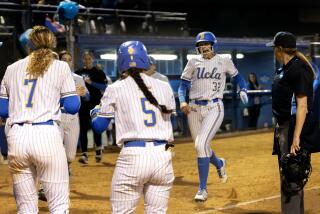‘Unique’ injury leads to unique acceptance
PALO ALTO -- On the night before his 18th birthday, Joe Kay threw down an emphatic, ovation-inducing tomahawk dunk for his Tucson High basketball team, the big man on campus delivering again.
The world, it seemed, was Kay’s for the taking.
At 6 feet 6, he was a basketball star and a scholarship-worthy volleyball player, an outstanding athlete and a top scholar, a straight-A student and class valedictorian, a math whiz and an award-winning saxophonist.
As he led a spirited victory over rival Salpointe Catholic, punctuating his performance with a dunk, delirious classmates chanted his name.
Soon, he would be headed to Stanford to play volleyball.
In time, he would be a lawyer, like his parents, or maybe a doctor.
Just about everything he’d ever attempted had been a slam dunk, his mother would say, so Kay’s future seemed unlimited, his success a certainty.
And then the game ended.
In the immediate aftermath, the crowd stormed the court in celebration, one particularly exuberant fan running straight at Kay and bowling him over. The star of the game wound up under a dog pile, tackled and trampled and terrified.
His neck was twisted, blood flow to his brain restricted.
Not quite old enough to vote, he suffered a stroke.
His life was changed forever.
Nearly 4 1/2 years later, in a campus cafe at Stanford, Kay offers his left hand in greeting and tells a visitor, “My accident was pretty unique.”
As was his acceptance of it.
Though Kay, 22, is unable to play, Stanford honored his volleyball scholarship. His right side is partially paralyzed, his right hand of limited use. He walks with a slight hitch in his step and suffers from aphasia, a partial loss of the ability to use or articulate words, although it’s not apparent until he mentions it.
“He has the strongest spirit,” says his mother, Suzanne Rabe. “He has accepted his injury with grace and in a very practical manner. . . .
“He marches forward.”
Majoring in American studies, Kay recently completed his junior year and landed a summer fellowship with Barack Obama’s presidential campaign.
He will work as an intern for a government agency in Washington in the fall, plans to study in Berlin next winter and, after graduating next June, still might pursue a law degree.
“I think I’ve progressed a lot,” he says, settling into a chair. “Obviously, I still have some physical limitations . . . and I still have some mental difficulties, like with word-finding and various things like that. But all those difficulties are pretty minor, comparatively, to difficulties I think I could have had.”
He misses sports, he says, “because I have to get on the elliptical machine for 30 minutes to get a good workout instead of just playing basketball or volleyball.”
When tackling complicated math problems, he says he tends to lose focus. As a freshman, the former saxophonist joined the Stanford band, tried to play the trumpet left-handed for about a month and then quit.
“It was going to be way too difficult to switch,” he says.
For the volleyball team, Kay works as an undergraduate assistant coach, media manager and blogger. As a freshman, he even covered the team for the Stanford Daily before his editors realized it was a conflict of interest.
On campus, he’s an advocate for disabled students.
And, he notes, “I’ve passed all my classes, a fact that I’m pretty proud of, although my actual grades haven’t been nearly as good as my grades back at Tucson High. Even if I hadn’t had this accident, I couldn’t have gotten all A’s at Stanford for all four years like I did in high school, but I definitely could have done better.”
Stanford volleyball Coach John Kosty calls Kay’s progress “absolutely amazing” and notes, “If you take a really close look, you’ll notice slight things that are different about him, but he functions just like any other person on campus.”
Two years ago, Kay was awarded $3.5 million in an out-of-court settlement of his suit against the Tucson school district and the two students who injured him. He says the award helped ease his mind, as did a recent, long overdue apology from one of the students whose actions left him disabled. But it irks him that the student he holds most responsible still has not come forward.
“That first guy who actually tackled me, if he hadn’t run at me with such vigor and intensity,” he tells a reporter, identifying the classmate as a football player he knew only in passing, “I don’t think we’d be sitting here talking. I think he was trying to lift me up, but maybe the football player in him caught him by storm.”
Kay is still hazy about what happened next.
“I remember the dunk,” he says, “but I don’t really remember anything after the dunk. The guy tackled me like two minutes later, and I remember being in the pile, not really knowing where I was or what happened.
“Pretty much, I was in a state of shock.”
Over time, his initial shock gave way to acceptance.
And perseverance.
“When I first got here,” he says, “I was a lot worse-off student than I am now. I was a lot worse off socially, friendship-wise. But now -- obviously, I’m not to where I was before my stroke, but I’m working on it.
“I’m in a good place, I think.”
His spirit endures.
--


